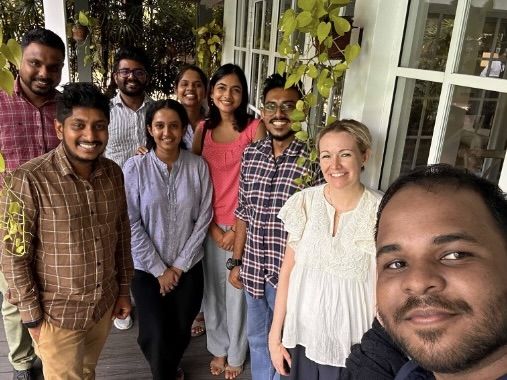“The only mistake you can make is not asking for help.”
This popular quote from Sandeep Jauhar’s memoir, Intern: A Doctor’s Initiation, is one of many lessons learned firsthand in the earliest, most brutal stages of Jauhar’s medical residency. The lesson — that you can often find support from mentors and peers if you simply ask for it — rings true for many people in professional settings, especially those who feel they need to prove their value in the workplace.
For developers interested in growing their career beyond the role of an individual contributor, there is significant potential for anxiety when it comes to asking for support or guidance. Leadership roles imply a certain degree of autonomy, and engineers may put additional pressure on themselves to achieve high performance with little or no direct support from their team as proof that they can handle the transition into management.
While it may seem counterintuitive, many engineering managers made their way into leadership by leaning on the support and guidance of their managers. Engineering leaders from Wise, Favor Delivery and Sysco LABS all credit the encouragement and mentorship of their managers as essential elements of their professional journey. In the spirit of Jauhar’s advice, they embraced their managers as partners in shaping their careers, and today, they aim to model the same joy, expertise and aid that their managers offered them as individual contributors.
Built In Austin spoke with engineering leaders from each of these organizations to hear more about their journey into leadership, how their mentors played a key role and the advice they have for other developers interested in moving into management.
Wise is a fintech company with a mission of “money without borders,” offering a fair, easy way to send money overseas.
What first led you to explore the idea of moving from an engineering role into a managerial position?
At a certain point in the career of an engineer, your impact is inherently limited by the number of hours you can dedicate to coding. To continue growing your impact, you need a multiplier effect, and this means helping a team succeed and influencing outcomes at a larger scale. Over time, I had already found myself naturally leading others by providing direction and mentorship, so transitioning into an official management position felt like the next logical step.
Encouragement from senior leaders also played a significant role in my transition into management, especially when I was asked to relocate to Austin to lead our U.S. engineering team and set up a new regional hub office for North America. This role allows me to stay connected to the technical challenges Wise is solving and our mission of money without borders, while extending my impact into shaping our wider North American workforce. In under four years, we have gone from just one employee here in Austin to over 400 — and counting.
How were you supported to make the shift into management? What were the biggest challenges you faced after changing roles?
Over the course of my career, I have worked alongside some excellent leaders who helped shape my individual approach to management. In my experience, the biggest challenge in taking this leap is that being an effective manager requires a different mindset than excelling as an individual contributor. As an individual contributor, success often means taking on the toughest challenges and solving problems on your own. In contrast, as a manager, it’s about enabling others to step up, solve problems and grow. In short, it becomes more about propelling your team’s growth and success.
“As a manager, it’s about enabling others to step up, solve problems and grow. In short, it becomes more about propelling your team’s growth and success.”
To this end, it’s important to foster a culture where your team can feel challenged and work together with each other and teams across the business, while still operating as independently as possible. Leaders should strive to be available but not relied upon. I have done this by setting a clear vision and empowering my team to make their own decisions, which includes allowing room for mistakes. This approach helps build trust and empowers my team to thrive.
What advice do you have for engineers looking to move into a management role? What do you wish you had known before making that change yourself?
My biggest piece of advice is to stay curious. Seek out and absorb more knowledge about leadership and other functions across your organization — in my case, this includes things like product and marketing — while maintaining your engineering roots. Of course, your technical expertise is what brought you this far, so keep it sharp by finding opportunities to write code and lead new projects, even if your role becomes more management-heavy. Balancing depth in your work with broader perspectives will make you more effective.
As I stepped into leadership, I learned to be much more intentional about my time and the value I bring to meetings or projects. As a leader, you get pulled in a lot of different directions. It’s up to you to determine which allows you to make the biggest impact on your team, your company and your mission. Having said that, it’s always important to be generous and share knowledge, whether it’s a major system architecture insight or a simple productivity tip.
Favor Delivery is a Texas-based restaurant delivery service.
What first led you to explore the idea of moving from an engineering role into a managerial position?
As an engineer, I found that my most fulfilling days at work were the days I helped the team plan and organize large initiatives and implement process changes that had a visible impact on the team’s productivity and quality of life. Making the jump to a people leadership role allowed me to stay technical while focusing on the aspects of engineering that gave me the most satisfaction.
How were you supported to make the shift into management? What were the biggest challenges you faced after changing roles?
I have been lucky to have awesome managers throughout my career journey. I was supported every step of the way when I shifted into people leadership myself. One of the helpful things that my manager at Favor did when I first started thinking about people leadership was finding opportunities for me to stretch my skills. I was put in situations where I could try out the skills necessary for people leadership and start building those muscles.
Transitioning from an individual contributor to a people leader is a big shift and there are plenty of new and exciting challenges to learn from. Time management, leading difficult conversations and swift decision-making were some of the first skills I leveled up. I continue to work closely with my leaders and mentors to grow as a leader.
“Time management, leading difficult conversations and swift decision-making were some of the first skills I leveled up.”
What advice do you have for engineers looking to move into a management role? What do you wish you had known before making that change yourself?
Test the waters and practice building management skills as an engineer. Look for ways to help your team that don’t involve writing code, completing tickets and creating pull requests. Be open with your manager about your career goals and what appeals to you about people leadership. They will be able to help you on this journey!

Sysco LABS uses customer and market intelligence, data-driven insights and agile technology development to reimagine the food service industry.
What first led you to explore the idea of moving from an engineering role into a managerial position?
I never imagined becoming a manager. I loved writing code and solving technical challenges. However, six months out of college, I began presenting technical designs to government officials and soon started serving as a technical lead. At the time, I was terrified. I didn’t feel qualified, but I’m never one to shy away from a challenge.
Eventually, I noticed some patterns about myself. I had a knack for seeing the big picture and rallying folks to achieve it. I loved discussing ideas, even if I felt guilty not being “hands-on-keyboard.” I found immense joy in coaching and helping others improve their craft.
Encouragement from colleagues and leadership inspired me to lean into these strengths and transition to management. Now that I am well into an engineering leadership career, I’m so grateful to those who pushed me out of my comfort zone. Their belief in my potential helped me discover strengths I didn’t initially see in myself.
How were you supported to make the shift into management? What were the biggest challenges you faced after changing roles?
Before transitioning to management, I gained foundational leadership experience volunteering with high school students at a nonprofit and serving on the board of my company’s Women in Tech group. These prepared me for the challenges of management, reinforced my passion for empowering others and provided an invaluable network of mentors.
Transitioning to a manager role, I was challenged by balancing coding with high-leverage tasks and shifting focus from team goals to company strategy. Initially, I struggled with the urge to stay deeply involved in coding as the best way to contribute. I realized that as a manager, time spent on org-focused, higher-impact tasks unlocked productivity and created broader value.
“Transitioning to a manager role, I was challenged by balancing coding with high-leverage tasks and shifting focus from team goals to company strategy.”
The second challenge was adjusting my mindset to balance team goals with company priorities. Many new managers initially focus solely on improving team productivity. Over time, I learned my role was to support company strategy while enabling my team’s engineering excellence. This at times meant prioritizing companywide initiatives over team-specific goals. It was an adjustment, but I learned to assess paths with meaningful, measurable impact versus “nice-to-haves.”
What advice do you have for engineers looking to move into a management role? What do you wish you had known before making that change yourself?
For those considering moving into engineering leadership, I do have some advice.
Remain in a technical, hands-on role for several years while taking on nontechnical responsibilities, such as mentoring or leading discussions. This allows you to develop leadership skills and determine if you enjoy the collaborative aspects of management.
An engineering manager role significantly involves collaboration sessions and facilitating discussions. Learn to run efficient, productive meetings and find joy in bringing people together. If you dread these interactions, consider the fit.
Creating positive environments is a key skill for any manager. Managing for sake of control over decisions often leads to failure for you and your team, drives poor team dynamics, limits output and stifles team members. A successful manager focuses on unlocking potential, not micromanaging outcomes.
I’m incredibly grateful to the leaders and colleagues who pushed me out of my comfort zone. Their belief in my potential helped me discover strengths I didn’t initially see in myself. I’ve also learned so much from my team members — they’ve been my greatest coaches, and their wisdom has been invaluable.











